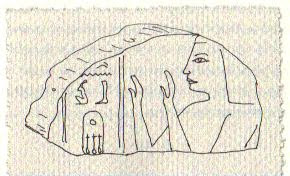The Pharoah's Secret written and illustrated by Marissa Moss, 308 pp, RL: MIDDLE GRADE

As you would expect from an author with a background of richly detailed fictional journals (Amelia's Notebook and Max Disaster), many of which are historical journals, Marissa Moss' first novel is filled with both. Set in Egypt, The Pharoah's Secret is narrated by fourteen year old Talibah and is both a mystery and adventure that unwinds like the Nile.
Talibah's mother died five years earlier and, in his grief, her father, an historian specializing in ancient Egyptian literature, has left her to take care of her brother Adom, now ten. When conferences coincide with the kids' spring break, he finally takes them on that trip to Egypt he and his wife had always planned. Small but strange things begin to happen almost the moment Talibah sets foot in Egypt. In front of their hotel, an old woman presses a cold stone object into her had, but Talibah is so taken with the woman's golden snake bracelet that she does not even notice at first. Through a series of dreams, voices and magnetic attraction to certain places and objects she encounters as she explores Cairo then Luxor, Talibah stumbles her way toward understanding.

The trail begins with Hatshepsut, one of the rare woman pharaohs in Egyptian history, and Senenmut, the architect of, among many other things, her monumental mortuary temple. There is quite a bit of cultural history and family trees to be explained as the web connecting the pharaoh, her daughter, her step-son/nephew and her architect, royal tutor, confidant, companion and possibly lover, Senenemut, becomes an integral part of the story. As Talibah uncovers this information from books and museum visits, she wonders about this, comparing Hatshepsut to Queen Elizabeth. She thinks both rulers represent women who are "proud, intelligent, gifted at politics and empire building," even though they are also women who came by their thrones though the death of or lack of male heirs. Talibah realizes that, while these women may have wanted to marry and have a family, doing so might have jeopardized their reign and made them seem less than legitimate rulers because their power would have passed into the men's hands.

The first three quarters of the book is taken up with Talibah's research as she follows a trail of clues. After a chance meeting with Rashid, the childhood friend of Talibah's father and an ancient Egyptian scholar who has recently discovered the tomb of Hapuseneb, a powerful nobleman from the dynasty of Hatshepsut, the children find themselves traveling to Luxor and the Valley of the Nobles with him while their father stays in Cairo attending conferences. As Talibah uncovers more information about Hatshepsut and her inner circle, both Hapuseneb and Rashid become menacing figures. By the time Talibah has put all the puzzle pieces together and is attempting to give Senenmut's soul a final resting place, Rashid is overcome with his obsession with Hapuseneb and traps the children in a tomb with a cobra.

There is also a wonderful reconciliation scene with Talibah and her father, who have never really discussed the loss of her mother. Significant themes in The Pharaoh's Secret center around the death rituals of the ancient Egyptians and their beliefs surrounding the afterlife and the afterlife of Talibah's mother, who died without fulfilling a task she had been given and without passing the task on to Talibah as she had intended to do when she was old enough to accept it. As she researches Hatshepsut and her life, Talibah finally uncovers the truth about her connection to this history and is able to put it to rest.

Marissa Moss' book is a complex story, rich with historical information and a touch of mystery. As she says in her Author's Note, she had intended to write a work of historical fiction, being the journal of Meru, fictional nephew of Senenmut. Text from Meru's fictional book does appear in the story as one of the artifacts that helps Talibah uncover the truth. The relationship between Talibah and her ten year old brother Adom is an important part of the story as well. Both motherly and protective at times and sisterly, annoyed and even a bit resentful on occasion, Moss does a wonderful job rounding out these characters, their love for each other and their realtionship. In the end it is Adom and Talibah's willingness to share her burden with him and rely on him as he has relied on her that allows her to succeed. While the historical cast of characters often takes a precedence in the The Pharaoh's Secret, it is the familial relationships of the contemporary characters that give the book it's breath of life.


